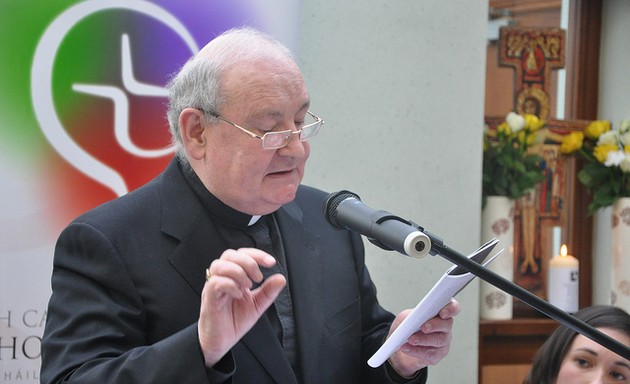28 June 2011
Council for Justice and Peace opposes cuts to Sunday pay and criticises bonus culture
- Cutting Sunday premium pay will further undermine the vital recognition of Sunday as a day of rest and, for many in our society, a sacred day of prayer.
- The protection of Sunday as a day of rest is vital for the physical, psychological and spiritual well-being of individuals and families, and for the common good of society.
- This proposal is a further example of the most vulnerable in our society being asked to bear the cost of the crisis while high earners continue to receive huge bonuses.
- It is vital that any measures adopted by Government to promote economic recovery are assessed for their impact on the most vulnerable in our society and on the common good
Bishop Raymond Field interview on cuts to Sunday pay
Commenting on the Government’s proposal to cut premium pay for Sunday workers, Bishop Raymond Field, the Chair of the Council for Justice and Peace of the Irish Catholic Bishops’ Conference stated, “In our publication From Crisis to Hope: Working to Achieve the Common Good, launched before the election, the Council for Justice and Peace emphasised that economic recovery cannot be achieved at the expense of the common good, the fundamental well-being of each and every member of our society. The proposal to cut Sunday premium payments is a prime example of a decision that would prioritise economic considerations at the expense of the well-being of citizens and the good of society.
“The value of Sunday as a collective day of rest cannot be overestimated. For Christians, this is a day central to the practice of our faith and our core position is that on the Sabbath day all non-essential work should be avoided. The protection of Sunday as a day of rest is vital to the physical, psychological and spiritual well-being of so many people in our society. Sunday is a time for the strengthening and protection of family life. In many households it is the only time when the whole family can be together.”
Bishop Field continued, “In From Crisis to Hope we underlined the importance of the family to society as a place of community, a place where essential values, such as solidarity, are first learned and experienced. We also drew attention to the suffering experienced by families where parents find themselves ‘time poor’ as a result of work commitments and unable to spend as much time with their children as they would wish.
“Given the value and significance of Sunday, outlined above, it is unsurprising that many of those who find themselves obliged to work on Sundays are people on lower incomes. Many of these people are already struggling to make ends meet; some are already experiencing poverty. It is unjust to ask these people to contribute further to addressing the cost of the crisis while high earners continue to receive huge bonuses.
“The combination of these two factors – the undermining of Sunday as a day of rest and the consequences for those on lower income – represents a significant threat to societal cohesion and the common good. Cutting Sunday premium pay would be a disappointing backwards step from a Government that began its first 100 days with the commendable decision to protect the minimum wage.
“In making this statement the Council is mindful of the significant pressures on employers at this time – particularly in small and medium-sized enterprises. In From Crisis to Hope we recognise that ‘[t]he impact of the economic downturn on the lives and on the health of employers as well as employees should not be minimised’. We believe, however, that any short-term financial gains from this measure would be negated by the long-term damage to our society, which affects all of us. It is vital that the Government protects and supports employers – for example, by ensuring that lending practices by banks and financial institutions support those who are contributing to society through enterprise and the provision of employment.”
Bishop Field concluded, “It is equally vital, however, that any measures adopted to promote economic recovery are assessed for their impact on the most vulnerable in our society and on the common good.”
ENDS
Notes for Editors
- The role of the Council for Justice and Peace of the Irish Episcopal Conference is to support the Irish Catholic Bishops’ Conference in promoting the social teaching of the Church and to advise on issues of social concern, both nationally and internationally.
- Bishop Raymond Field is Chair of the Council for Justice and Peace and Dr Nicola Rooney is Research Coordinator.
- The Council for Justice and Peace was formerly known as the Irish Commission for Justice and Social Affairs. The publication From Crisis to Hope: Working to Achieve the Common Good is available to download from www.catholicbishops.ie/justice and is also available from Veritas stores, price €3.99/£3.39
Further information:
Catholic Communications Office Maynooth: Martin Long 00353 (0) 86 172 7678 and Brenda Drumm 00353 (0) 87 310 4444


